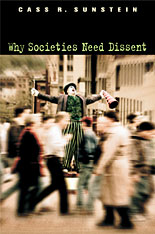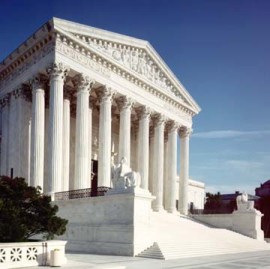09 Nov Cass Sunstein
Probably the most cited law professor on any faculty in the U.S. Cass R. Sunstein is Karl N. Llewellyn Distinguished Service Professor of Jurisprudence at the University of Chicago Law School.

A contributing editor at The New Republic and The American Prospect, and a frequent contributor as well to such publications as the New York Times Book Review and the New York Review of Books. He is the recipient of the Henderson Prize, and the Goldsmith Book Prize. His many books include Republic.com, Why Societies Need Dissent, Risk and Reason, Designing Democracy: What Constitutions Do.
During this year We’ve been exchanging some emails with professor Sunstein. Here are some of his incisive reflections:
Why Societies Need Dissent (2003).- Dissenters are crucial because they keep the majority honest. Without dissenters, organizations will often go wrong.

Companies as well as governments need clashing opinions, to ensure that they don’t go in bad directions. In the United States, companies do well if they encourage dissent on their boards. The Nixon Administration blundered, in some ways, because it discouraged internal disagreement; the same is true of the current Bush administration.
Remember that like-minded people end up going to extremes. – Dissent can be a good corrective against unjustified extremism. Of course dissenters can’t ensure that they’ll be heard or taken seriously. But if they speak out, that’s more likely at least.
Republic.com (2001).- On the mass media, it’s often a matter of shouting matches, in which a liberal says something silly and simple and often ridiculous, and then a conservative says something silly and simple and often ridiculous, and then the radio or television station congratulations itself on its open-mindedness. There’s a lot less substantive discussion than there should be. Also, people are sorting themselves, a bit, into echo chambers.
Our public forums have gotten pretty fragmented,- So people don’t hear, enough, serious arguments by people who disagree with them. One big problem is that when people talk and listen mostly to people who think as they do, they tend to end up in an extreme position. We’ve certainly seen that in the United States.
People listen to echoes of their own voices.They don’t consult conflicting points of view, or seek out opinions that differ from their own. Now I don’t mean to say that the situation is disastrous. Many people do expand their horizons. But many do not. Direct democracy is a mixed blessing, because we want deliberation in government, not just reactions to what citizens happen to think at the moment.
Healing means surrender.- President’s divisive agenda should be aggressively resisted.
Discussion and argument! President Bush has a lot of good ideas; for example, he’s right to say that we need to reform our system of litigation, which often produces arbitrary jury awards (punishing doctors and hospitals, for example, in a way that ultimately hurts patients, by raising costs). But President Bush hasn’t proved to be a good listener. On some issues he’s both divisive and extreme. We need to do much more to help those at the bottom of the economic ladder.

http://www.supremecourtus.gov/
Radicals in Robes (2005).- We need to make sure that our judges are moderates and that they don’t interpret the Constitution to mesh with most extreme statements in the Republican party platform. We live in a democracy, fortunately, and so all the channels remain open for debate and discussion.



Sorry, the comment form is closed at this time.